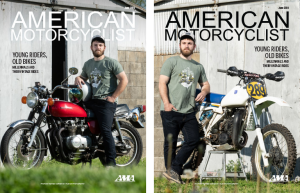AMERICAN MOTORCYCLIST June 2019
On the right track
How Three Women Became AMA Track Racing Promoters
 Evelyne Clarke, Delvene Reber, and Chris Daronco took different paths to their careers as race event organizers and promoters.
Evelyne Clarke, Delvene Reber, and Chris Daronco took different paths to their careers as race event organizers and promoters.
One attended her first competition as the date of a racer. The father of another was a land speed racer. And the third got involved through the family charity.
Each now oversees AMA track racing Grand Championships or AMA National Championships, and all are proud of their accomplishments and happy with their businesses.
The three stand ready to encourage other women who are interested in the business side of motorcycle competition.
Chris Daronco, AMA Ice Race National Championship
For 2019 AMA Ice Race National Championship promoter Chris Daronco, operating a charity runs in her family.
She said her parents were flat track racing enthusiasts and founded the Steel Shoe Fund in 1997 to provide financial support for injured flat track racers.
“We had a local racer who was paralyzed after, of all things, falling out of a tree stand,” she said. “At that time, there weren’t any charitable foundations to help injured riders.”
Daronco took over managing the organization in 2007, and said she has paid out more than $90,000 since.
The fund’s major fundraising event is an annual three-hour ice race, which served as the AMA’s Ice Race National Championship for 2019. The race has grown from 52 teams competing in 2007 to 113 in 2019.
As the promoter of racing events for injured riders, safety is at the top of her priority list for every event she puts on.
“I do everything in my power to minimize the danger by having quality tracks for [racers] to compete on,” she said.
Daronco believes the reputation of the events she operates speak to the passion she puts into her work for the fund.
“I don’t think it really matters to the riders that I’m a woman,” she said. “I’ve been around racing so much and for so long, that even a newcomer can figure out soon enough after talking to me that I know what I’m talking about.”
She credits her success to surrounding herself with the right people.
“My dad has been a valuable asset to me, teaching me everything I know about flat track and always is there as a sounding board,” she said. “My brother, Bert, is also part of the team.”
Her advice to aspiring race promoters is to do their homework on what it takes to put on a good event.
She also recommends taking the time to get to know racers.
“They will be your biggest supporters,” she said. “Bad news travels way faster than good news. If your racers believe in you, they will stick by when things don’t go as planned.”
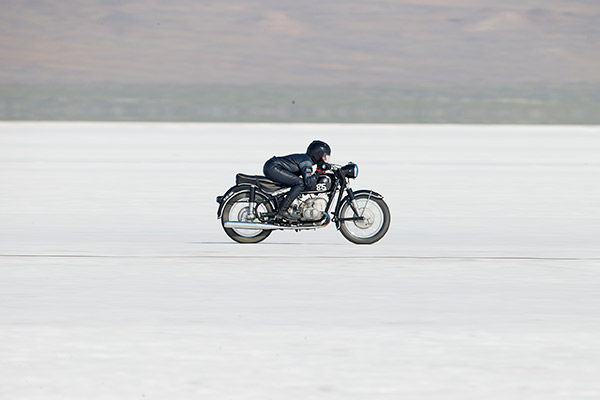
Delvene Reber, AMA Land Speed Grand Championship
Delvene Reber’s path to owning and operating the Bonneville Motorcycle Speed Trials began in the back seat of a hot rod. Her father, Keith “Stampy” Stamp, was a hot-rod builder, and his land speed racing career instilled a passion in her for the discipline.
She also is the former daughter-in-law of long-time event promoter and AMA Motorcycle Hall of Famer Denis Manning.
It was a trip to a land speed event in Lake Gairdner, Australia, in March 2000 where she met Manning.
Reber said she began working with the Manning BUB racing team, and, in 2004, she worked with Manning to establish the BUB Motorcycle Speed Trials event. Their goal was to re-establish an AMA-sanctioned presence for motorcycle land speed racing at Bonneville that would allow competitors to chase national and world land speed records.
She had to work closely with AMA and Fédération Internationale de Motocyclisme officials to get the event running. She oversaw the logistics associated with the event and became the event owner in 2014.
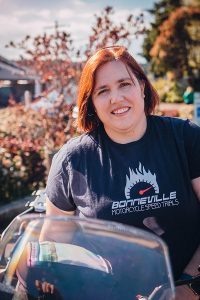
Delvene Reber has overseen the Bonneville Motorcycle Speed Trials through tough times and is proud that it is open to everyone, regardless of gender
Reber was the 2015 recipient of the AMA Bessie Stringfield Award, presented annually to an individual who has been instrumental in bringing emerging markets into the world of motorcycling.
Reber is proud of the increasing number of women participating in land speed motorcycle competition.
“Over the years, we’ve seen the participation of women increase from four to more than 30, not to mention the increase in support of racers as mechanics and pit crew and volunteers,” she said.
For Reber, one of the more gratifying parts of motorcycle land speed competition is that there are no class gender distinctions.
“There are not men’s or women’s records,” she said. “There is an AMA National and FIM World Record. Everyone has a shot at being the fastest.”
While the BUB organization has won the AMA Organizer of the Year Award several times, Reber said the Bessie Stringfield Award’s recognition of her efforts to increase diverse participation in land speed motorcycle racing is more meaningful to her.
Reber has watched women competitors mentor younger female racers. And she wants to encourage women to race and to get involved in other aspects of the sport.
The AMA Land Speed Grand Championship has had its highs and lows under Reber’s ownership, from a complete rainout in 2015 to the thick, dry racing surface at the 2018 edition of the event.
Owning an event that operates once a year in a sensitive ecosystem can be extremely challenging. The weather and salt conditions play a big role in the success of each year’s event, and it takes about two weeks of work to prep the salt for racing.
“It is a huge challenge to keep up with the appropriate methods to prep our courses or depending on conditions, where to site the course in the 46 square miles of operations area,” she said. “In spite of this huge land area, there are only a small number of places that we can logistically put our race tracks.”
She hopes the event continues to grow in the years to come, and she encourages other women to not let fear or obstacles stand in the way of their goals.
“I don’t feel like there should be any barriers for you to achieve what you want and be able to conduct a world-class event regardless of the stage on which you race,” Reber said. “Sometimes you will encounter them, but I find it important to stay true to your vision, have grit and learn to delegate.”
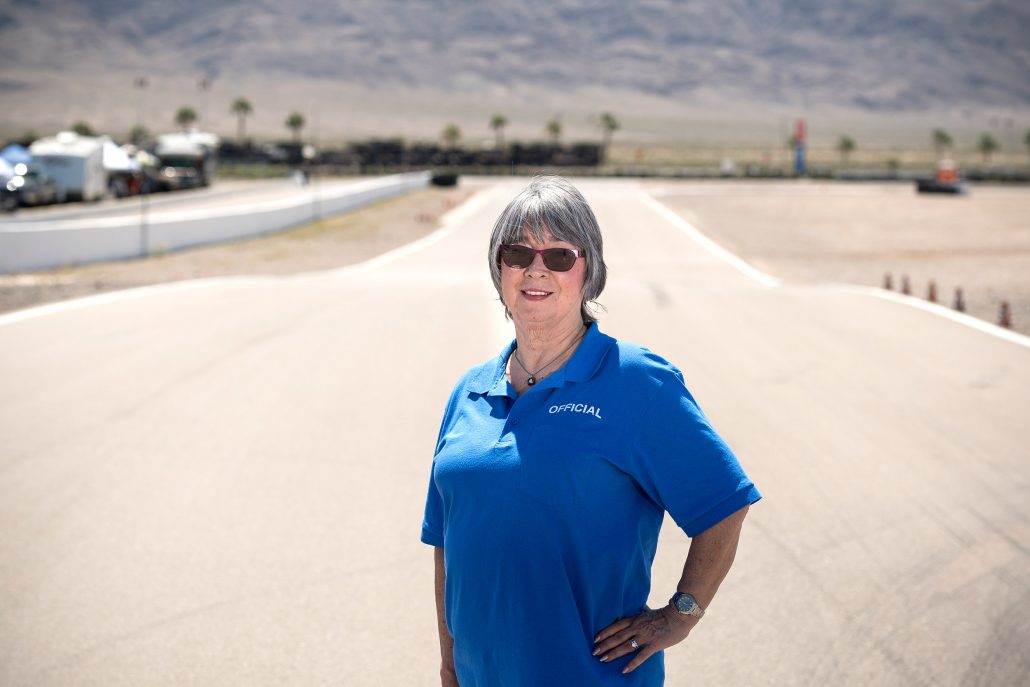 Evelyne Clarke, AMA Road Race Grand Championship
Evelyne Clarke, AMA Road Race Grand Championship
It was a date with destiny when Evelyne Clarke attended her first WERA Motorcycle Roadracing Inc. event in 1976. She went with a racer she was dating and got bored quickly.
Not content to simply sit in the paddock, Clarke walked up to a race official and asked if she could help with anything. At the next race she attended, the then-owner of the series asked her to take on the role of chief registrar.
During the next 13 years, Clarke worked in many roles for WERA, including timing and scoring, accounting and flagging corners. She used that time to learn about the many roles required to put on a successful motorcycle racing event.
Clarke’s role within WERA grew again when she became a part owner of the series in 1989, and she became its sole owner in 2000.
WERA operates the AMA Road Race Grand Championship, as well as the road racing competition at AMA Vintage Motorcycle Days each summer.
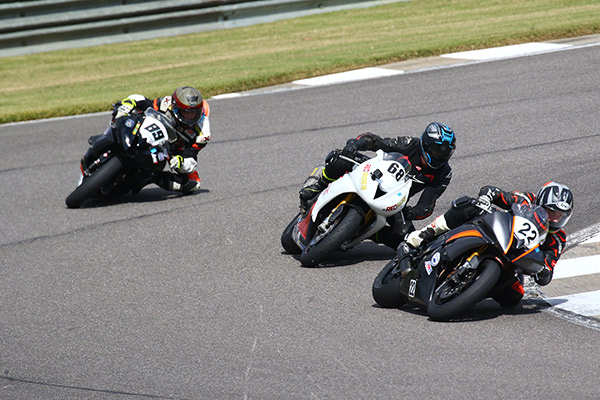
Evelyne Clarke worked in a variety of roles for WERA before becoming a part-owner of the road racing series in 1989.
Though she oversees a national road racing organization that puts on about 30 events each year, Clarke doesn’t ride much, beyond guiding a pit bike around a paddock.
“I’ve been mostly a passenger,” she said. “I’ve ridden a dirt bike and have gone out on trails with quads, but I’ve never owned anything bigger than a [Yamaha] Zuma.”
In her 30 years of series ownership, Clarke has seen WERA through difficult times and kept it afloat despite changing market conditions and racers’ preferences.
“The challenge the past few years has been the weather, since our events run rain or shine; but riders don’t like the rain part,” she said.
Despite the challenges, Clarke is proud of what WERA has been able to accomplish. One aspect of that pride is WERA’s role in developing young road racing talent.
“WERA Motorcycle Roadracing has always catered to bringing in new talent,” she said. “We offer rider schools and start our racers on track at age 9 and help them build their dream—or, in many cases, their career.”
“I’m still here and feel I have earned my place and have earned respect in the community of motorcycle road racing.”
The series has seen national and international racers rise through its ranks, including AMA Motorcycle Hall of Famers Scott Russell, Freddie Spencer and Kevin Schwantz, three-time AMA Superbike Champion Ben Spies and four-time AMA Superbike Champion Josh Hayes.
Clarke feels she has been accepted by the road racing community, but that she had to prove herself to get to the position she has attained.
“I had many toe-to-toe discussions with track owners, riders and officials but for the most part I have worked all these years in a man’s world, so to speak,” she said. “I’m still here and feel I have earned my place and have earned respect in the community of motorcycle road racing.”
Clarke encourages other women to aim for and take on leadership positions in race organizing but cautions that the experience will not be without its struggles.
“Know that you will be challenged and be ready to cry in private,” she said. “But know that, if you keep going, you grow stronger, and the crying does not come as often. Be ready to make some sacrifices when it comes to time with family, but know you are building a family with your riders if you take care of them.”

